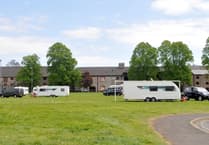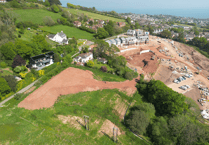Despite a half-century of Fleet Street and TV investigations I doubt I would have detected Crowhurst’s daring deception, writes TED HYNDS.
Nobody could. His hoax and descent into madness only evolved as events overtook him.
At the time my only suspicions, if you could call them such, were of his sailing abilities.
He was a pleasant hail-fellow-well-met sort of chap.
More than a bit of a boffin, and most decidedly a son of the Raj, brought up in pre-war India.
He was obviously very bright, but he had the smooth talking plausibility of a dodgy secondhand car dealer.
We met in the spring of 1968, I as a young freelance reporter, working for Rodney Hallworth’s Devon News Agency at Exeter.
I was the first to interview him on behalf of the Sunday Times.
They wanted a potted biography, plus pictures of this rank outsider in their much-vaunted non-stop round the world yacht race.
SLIGHTLY SHABBY AIR TO HIS HOUSE
With a photographer, I drove to Woodlands, his rambling, down-at-heel large house near Bridgwater.
Everything about it had a slightly shabby air, from the children’s toys scattered around the drive to the tatty furniture and unpolished grand piano in the living room.
There was a whiff of failure about the whole place, which our very experienced snapper also picked up on.
He pithily commented that this place was ‘All fur coat and no knickers’.
We were amazed that it belonged to a man proposing to sail round the world.
He had a sense of entitlement about him and definitely thought of himself as officer material, although he was always very decent to me.
But we got the impression his wife regarded us in Private Eye’s favourite expression as ‘reptiles’ – way down the social scale.
I don’t think that view ever changed, before, during and after his voyage.
SNIFFED A NEWS OPPORTUNITy
As far as she was concerned we were lowlifes, which was ironic really if we wanted to be snooty.
Rodney was a respected national journalist, the son of a wealthy department store owner and we had both won scholarships to public schools.
And he immediately sniffed a news opportunity when I reported back that this entry had no press agent.
That soon changed. Within a fortnight, a lunch at Taunton with Rodney, followed days later by a boozy ‘lock-in’ at our local, the George and Dragon.
These meetings cemented his relationship with Devon News and, by extension, Teignmouth.
What followed was a madcap five months to meet the final departure date of October 31.
It must have been obvious from the outset that this whole enterprise was heading for catastrophe.
Both man and boat were painfully unprepared.
The gloomy predictions of disaster by the port’s gnarled boatmen proved prescient.
Yet we were carried along on a wave of optimism which ignored the harsher realities of the situation.
Don blithely calculated making 200-plus nautical miles a day in his revolutionary multi-hull.
He even felt he could overtake the first competitors who had started before he even signed up for entry.
We fed the nationals stories of the variously ‘gallant, plucky, whacky, brave, dark horse,’ who would turn the race on its head.
A cold dose of reality finally came with a cold grim day of departure.
I’ll never forget Don in his yellow all-weather gear over a business suit, scrabbling among the dozens of loose supplies lining the deck.
It was a shambles.
And after this chaotic start he turned back to stow his gear and untangle a sail in the shelter of the headland.
translating gobbledygook
From then on it deteriorated fast.
The expected regular, lengthy reports, passed through Portishead radio base, were sparse. This was probably deliberate.
Crowhurst had moved into his default mode.
Back in our office we had to unscramble these often unintelligible few words. Of course, as journalists, we had no option but to translate this gobbledygook into meaningful prose.
Not an easy job. But amazingly, as the weeks turned into months, ‘our man’ seemed to outdo expectations and somehow kept up speed.
Before he lapsed into radio silence – to preserve his damaged battery supply as we thought – he rounded Cape of Good Hope and headed into the great Southern Ocean.
This was the terrifying wasteland of the Roaring Forties. Next landmark Cape Horn.
Perhaps not surprisingly, only that first solo circumnavigation sailor, Sir Francis Chichester, ever had any reservations.
As the months passed he voiced low key suspicion at the speeds Crowhurst claimed.
But not even this expert seaman thought the man was merely stooging around off the shipping lanes, or putting in at a remote Argentine estuary for makeshift repairs.
Despite the vessel’s incredible speed potential his newly-built trimaran never underwent extensive sea trials.
It took him over a fortnight to deliver the experimental boat round the coast from Essex to Teignmouth – normally a simple 72-hour sail.
The day after joining the race it had sprung a serious leak in one hull.
More worrying faults grew as it limped south towards the Atlantic, and bits began to break or fall off.
I believe he realised within weeks of setting sail that his race was doomed to failure.
The boat just wasn’t strong enough to face the raging seas at the bottom of the world.
This spelled domestic disaster. A tough contract with sponsor Stanley Best meant failure to finish would force him to buy back the boat at cost.
IDEA WAS BOTH SIMPLE AND FEASIBLE
Only his house sale could achieve this, leaving his wife Clare and four children homeless.
So under this terrible pressure he changed the plan and began that phantom voyage instead.
His idea was both simple and feasible. Hide in calm waters, land and make repairs in a secluded spot, then keep radio silence until the other contestants had made it home.
Without qualifying for either £5,000 prize for first and fastest back he knew he could avoid scrutiny of his log books.
He would be the gallant outsider, who finished an honourable last, behind the fleet.
Home and reputation saved. Of course his brief South American landfall might be revealed later, but by then no one would care.
Keeping communication to a minimum he encouraged his press agent with cryptic hints to believe this rank outsider might be in with a chance.
Then for months he maintained radio silence, his whereabouts a mystery and growing fears that he had sunk.
But the race went on unabated, with a growing drop-out list.
By the time Robin Knox Johnston limped home first, only naval commander Nigel Tetley remained of the nine starters.
Provided his damaged vessel stayed afloat he would complete the fastest voyage.
It was his progress that Crowhurst was keenly tracking by radio.
All he needed was to pick his moment when Tetley was in the final approaches and appear out of the blue, alive but way behind.
Tragically he timed it wrongly.
Euphoria had greeted his survival and news hyperbole put him much closer behind. It proved his nemesis.
Galvanised by these reports, Tetley pushed hard towards his finish line. Too hard. Inevitably his boat broke up off The Azores and he had to be rescued.
Now Crowhurst was the last man standing and his log would be subjected to intense scrutiny.
disgrace stared him in face
His bogus claims would be easily debunked.
Disgrace and shame stared him in the face. He snapped and somewhere in mid-Atlantic slipped quietly overboard to find his peace.
Part of me sympathises with this deeply troubled man. But there is also anger.
He left both his dummy and true logs, clear evidence of the whole devious fraud, neatly laid out on the cabin table.
Had he thought to spare his family shame, recriminations and abiding hurt all he needed to do was take his words with him.
It would have been a modern Mary Celeste mystery of the sea.
Donald Crowhurst could have died an inspirational hero. But perhaps his mental turmoil was just too much to bear any longer and this ending truly was The Mercy.





Comments
This article has no comments yet. Be the first to leave a comment.